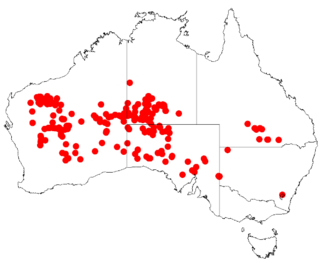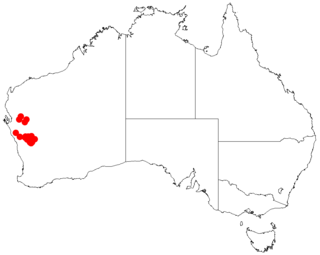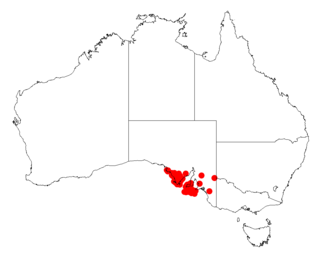
Acacia ayersiana is a plant that grows in arid areas of Australia.
Acacia anastomosa, also known as Carson River wattle, is a shrub belonging to the genus Acacia and the subgenus Juliflorae that is endemic to north western Australia.

Acacia effusifolia is a shrub or tree belonging to the genus Acacia and the subgenus Juliflorae. It is native to an area in the Mid West and the Wheatbelt regions of Western Australia.

Acacia hamersleyensis, also known as Karijini wattle or Hamersley Range wattle, is a tree or shrub belonging to the genus Acacia and the subgenus Juliflorae. It is endemic to a small area in central Western Australia.

Acacia incognita, also known as false sugar brother, is a shrub or tree belonging to the genus Acacia and the subgenus Juliflorae that is endemic to Western Australia.

Acacia lirellata is a shrub belonging to the genus Acacia and the subgenus Juliflorae that is endemic to south western Australia.

Acacia mulganeura, commonly known as milky mulga and hilltop mulga, is a tree or shrub belonging to the genus Acacia and the subgenus Juliflorae that is endemic to arid parts of central and western Australia.

Acacia oncinocarpa is a shrub or tree belonging to the genus Acacia and the subgenus Juliflorae that is endemic to northern Australia.

Acacia paraneura, commonly known as weeping mulga, is a tree or shrub belonging to the genus Acacia and the subgenus Juliflorae. It is native to arid regions of Australia. The Indigenous Kurrama peoples know the tree as warlun.

Acacia ptychophylla is a shrub belonging to the genus Acacia and the subgenus Juliflorae the is endemic to arid areas of north western Australia.

Acacia ramulosa, commonly known as horse mulga or bowgada wattle, is a shrub belonging to the genus Acacia and the subgenus Juliflorae endemic to arid areas of Australia.

Acacia rhodophloia, commonly known as minni ritchi or western red mulga, is a tree or shrub belonging to the genus Acacia and the subgenus Juliflorae that is endemic to a large area of arid central western Australia. The Indigenous group the Kurrama peoples know the plant as mantaru.
Acacia stanleyi, commonly known as Stanley's rock wattle, is a shrub belonging to the genus Acacia and the subgenus Juliflorae that is endemic to south western Australia.

Acacia stipuligera is a tree or shrub belonging to the genus Acacia and the subgenus Juliflorae. It is native to arid and tropical parts of northern Australia.

Acacia profusa is a shrub of the genus Acacia and the subgenus Phyllodineae that is endemic to south western Australia.

Acacia validinervia also commonly known as nyalanyalara, nyala nyala, alumaru or blue wattle, is a shrub of the genus Acacia and the subgenus Phyllodineae endemic to arid areas of inland Australia.

Acacia cassicula is a shrub of the genus Acacia and the subgenus Plurinerves that is endemic to an area of south western Australia.

Acacia triquetra, also known as the gold dust wattle, is a shrub belonging to the genus Acacia and the subgenus Phyllodineae native to southern Australia.

Acacia torringtonensis is a shrub belonging to the genus Acacia and the subgenus Phyllodineae native to eastern Australia.

Acacia pycnostachya, also known as Bolivia wattle, is a shrub or tree belonging to the genus Acacia and the subgenus Juliflorae that is native to eastern Australia.


















